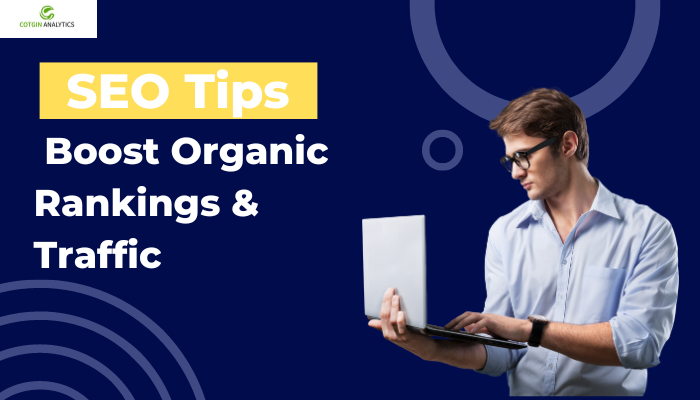In the ever-evolving landscape of digital marketing, search engine optimization (SEO) remains a critical component for driving organic traffic and achieving higher rankings on search engines like Google. With search engines constantly updating their algorithms, staying on top of the latest SEO best practices is essential for businesses looking to maintain or improve their online visibility. This guide provides actionable SEO tips to help boost your organic rankings and drive more traffic to your website.
1. Optimize for Mobile Usability
With the increasing number of users accessing the web via mobile devices, mobile optimization is no longer optional—it’s a necessity. Google’s mobile-first indexing means that the mobile version of your website is now the primary version used for ranking and indexing. Ensure your website is fully responsive, loads quickly on mobile devices, and provides a seamless user experience. Tools like Google’s Mobile-Friendly Test can help you assess and improve your mobile site performance.
2. Conduct Thorough Keyword Research
Keyword research is the foundation of effective SEO. Start by identifying the keywords and phrases your target audience is searching for. Use tools like Google Keyword Planner, Ahrefs, or SEMrush to discover high-volume keywords with manageable competition. Focus on long-tail keywords that are more specific and likely to attract highly targeted traffic. Once you’ve identified your keywords, strategically incorporate them into your content, including titles, meta descriptions, headers, and throughout the body of your text.
3. Create High-Quality, Relevant Content
Content remains king in the world of SEO. Search engines prioritize content that is valuable, relevant, and engaging to users. Focus on creating content that answers questions, solves problems, or provides valuable information to your audience. Use a variety of content types, such as blog posts, infographics, videos, and case studies, to appeal to different audience segments. Consistently updating your content and ensuring it is comprehensive and well-researched can help establish your site as an authority in your niche, leading to higher rankings and increased traffic.
4. Optimize On-Page SEO Elements
On-page SEO involves optimizing individual web pages to improve their search engine rankings. Key on-page elements to focus on include:
-
Title Tags: Craft compelling and keyword-rich title tags that accurately describe the content of your page.
-
Meta Descriptions: Write clear and concise meta descriptions that include your target keywords and encourage clicks.
-
Headers: Use header tags (H1, H2, H3) to structure your content, making it easier for search engines to understand and index.
-
Image Alt Text: Optimize your images by including descriptive alt text that incorporates relevant keywords.
Ensuring that these elements are optimized can significantly enhance your website’s visibility on search engine results pages (SERPs).
5. Improve Page Load Speed
Page load speed is a crucial factor in both user experience and SEO. Slow-loading pages can lead to higher bounce rates and lower rankings. Use tools like Google PageSpeed Insights to analyze your website’s load time and identify areas for improvement. Consider optimizing images, minimizing HTTP requests, and leveraging browser caching to enhance your page speed. A faster website not only improves your SEO but also contributes to a better overall user experience.
6. Build High-Quality Backlinks
Backlinks are one of the most important ranking factors in SEO. High-quality backlinks from reputable websites signal to search engines that your content is valuable and trustworthy. Focus on building backlinks through guest posting, creating shareable content, and engaging in industry collaborations. Avoid low-quality or spammy links, as these can harm your rankings. The key is to earn backlinks naturally by providing valuable content that others want to link to.
7. Leverage Internal Linking
Internal linking is often overlooked but is an essential part of SEO. By linking to other relevant pages within your website, you can help search engines understand the structure and hierarchy of your content. Internal links also help distribute link equity across your site, improving the rankings of important pages. Be strategic with your anchor text, using keywords that are relevant to the content being linked to.
8. Optimize for Voice Search
With the rise of voice-activated devices like Siri, Alexa, and Google Assistant, optimizing for voice search is becoming increasingly important. Voice search queries tend to be longer and more conversational, so incorporating natural language and long-tail keywords into your content is essential. Focus on answering questions directly and clearly, as voice search often pulls from featured snippets or “position zero” on SERPs.
9. Utilize Structured Data Markup
Structured data, or schema markup, helps search engines better understand the content on your website. By adding schema markup to your pages, you can enhance your SERP listings with rich snippets, such as star ratings, reviews, and event information. This can make your listings more attractive to users, leading to higher click-through rates (CTR) and improved rankings.
10. Monitor and Analyze Your SEO Performance
SEO is not a one-time task but an ongoing process that requires regular monitoring and adjustments. Use tools like Google Analytics, Google Search Console, and third-party SEO software to track your website’s performance. Pay attention to key metrics like organic traffic, bounce rates, and keyword rankings. Regularly reviewing your SEO strategy and making data-driven decisions can help you stay ahead of the competition and continue to improve your rankings.
Conclusion
Boosting your organic rankings and driving traffic requires a combination of technical optimization, high-quality content, and strategic link-building. By implementing these SEO tips, along with expert guidance from Cotgin Analytics, you can enhance your website’s visibility on search engines, attract more visitors, and ultimately achieve your digital marketing goals. Remember, SEO is a long-term investment, and consistent effort, coupled with insights from Cotgin Analytics, will yield significant results over time. Keep adapting to changes in search engine algorithms and evolving user behaviors to maintain your competitive edge in the digital landscape.


